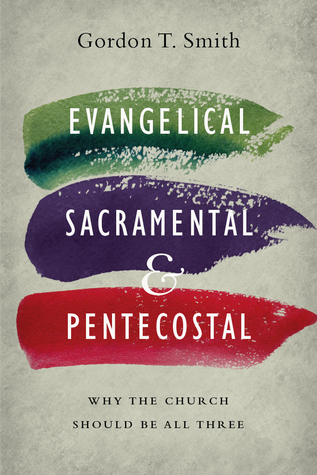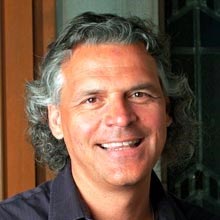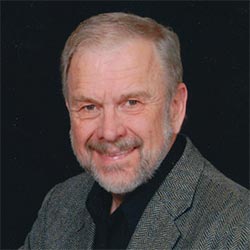

Paperback, 143 pages
Published March 21st 2017 by IVP Academic
ISBN 0830851607 (ISBN13: 9780830851607)
Evangelical, Sacramental, and Pentecostal
Why The Church Should be All Three
Evangelical. Sacramental. Pentecostal.
Christians tend to divide into three camps: evangelical, sacramental, and pentecostal. Gordon Smith longs to see these three traditions unite together. Through a reflection on what it means to be in communion with the ascended Christ, Smith issues a call for Christians to integrate the three traditions in their communities of faith.
Christian communities tend to identify with one of those labels over the other two. Evangelical churches emphasize the importance of Scripture and preaching. Sacramental churches emphasize the importance of the eucharistic table. And pentecostal churches emphasize the immediate presence and power of the Holy Spirit. But must we choose between them? Could the church be all three?
Drawing on his reading of the New Testament, the witness of Christian history, and years of experience in Christian ministry and leadership, Gordon T. Smith argues that the church not only can be all three, but in fact must be all three in order to truly be the church. As the church navigates the unique global challenges of pluralism, secularism, and fundamentalism, the need for an integrated vision of the community as evangelical, sacramental, and pentecostal becomes ever more pressing. If Jesus and the apostles saw no tension between these characteristics, why should we?
Available at any of the following.

This book should awaken us from our churchly slumbers. The evangelical, sacramental, and pentecostal streams of Christianity celebrate different things, but we should not think of them, argues Gordon Smith, as competing alternatives. Rather, each of these traditions highlights something essential to full-orbed and flourishing Christian experience. We can no longer afford to pick one favorite while neglecting what the others have to offer. This is a provocative call for a fresh ecumenical synergy—for weaving all these elements together into something stronger and better than the older, isolating silos were able by themselves to deliver. Ever the pastor-theologian, Smith concludes with some practical proposals for moving us in this right direction.
Professor of theology and ethics, Bethel Seminary San Diego

In Evangelical, Sacramental, and Pentecostal, Gordon Smith is a constructive provocateur. The word and in the title of the book is far from a mere grammatical connector. ‘And’ is indicative of Smith’s call to Christians, including evangelical Christians, to embrace together realities which too often are considered incompatible with each other, if not denied altogether. Furthermore, this call is not a call primarily to individual Christians or to some form of private piety. It is a call to churches—a call to churches to be the church. At the same time, this book is not primarily a critique but an invitation—an invitation to enter into and celebrate, in Smith’s words, ‘an ecology of grace.’ Evangelical, Sacramental, and Pentecostal is a wise and thoughtful invitation, accompanied by concrete suggestions, for churches to enter more fully into the grace that is found in union with Christ.
Professor of theology and historical studies, Denver Seminary

Christians often live in a state of spiritual malnourishment, choosing exclusively between the Word, sacraments, or renewal by the Spirit. In this timely pastoral appeal to overcome historical and theological divisions, Gordon T. Smith invites believers to be drawn into the fullness of life—fellowship with the living God—by embracing the divinely appointed means of grace.
Professor of theology, Wheaton College

This is a timely and significant book because it captures the emerging ecumenical, experiential spirit of our times. Smith’s book offers a brilliant and practical vision for how the contours of an evangelical, sacramental, and pentecostal spirituality can be integrated into a full-orbed Christian spirituality and ecclesiology. This kind of perspective is absolutely in tune with what the church in post-Christendom needs in these days when we are redefining our identity as God’s people and need resources to help guide us in that important work.
Associate professor of Christian ministry, McMaster Divinity College, author of The Church in Exile

This book is a wonderful corrective to the tendency to be locked into our own theological tradition and be critical of other perspectives. Our Christian communities would be more vibrant and attractive to the unbelieving world if we intentionally incorporated the best in all traditions. Dr. Smith’s book demonstrates how this can be done with integrity.
Professor of New Testament, Alliance Theological Seminary
Gordon T. Smith, president of Ambrose University in Canada, has an exciting and promising proposal in his new book Evangelical, Sacramental, and Pentecostal: Why the Church Should Be All Three. Smith has fashioned a beautiful vision for the unity and interdependence of these major streams of the church. . . . What Smith offers is no airy-fairy ecumenical project. His point is not simply that we can learn from different traditions, but rather that we need each other to survive and thrive in the modern world.
Christianity Today, April 2017
Excited by Smith’s call for a more robust church life, I believe this book can be a tool for the church to become more of what it is called to be—both through more balanced fellowship practices and through healthier ecumenical cooperation and relationship. It provides a solid starting point for churches.
July 31, 2017
Smith’s book will act as a good introduction for Bible-believing Christians to embrace the sacramental and pentecostal approaches.
Faith Today
 Gordon T. Smith
Gordon T. Smith

